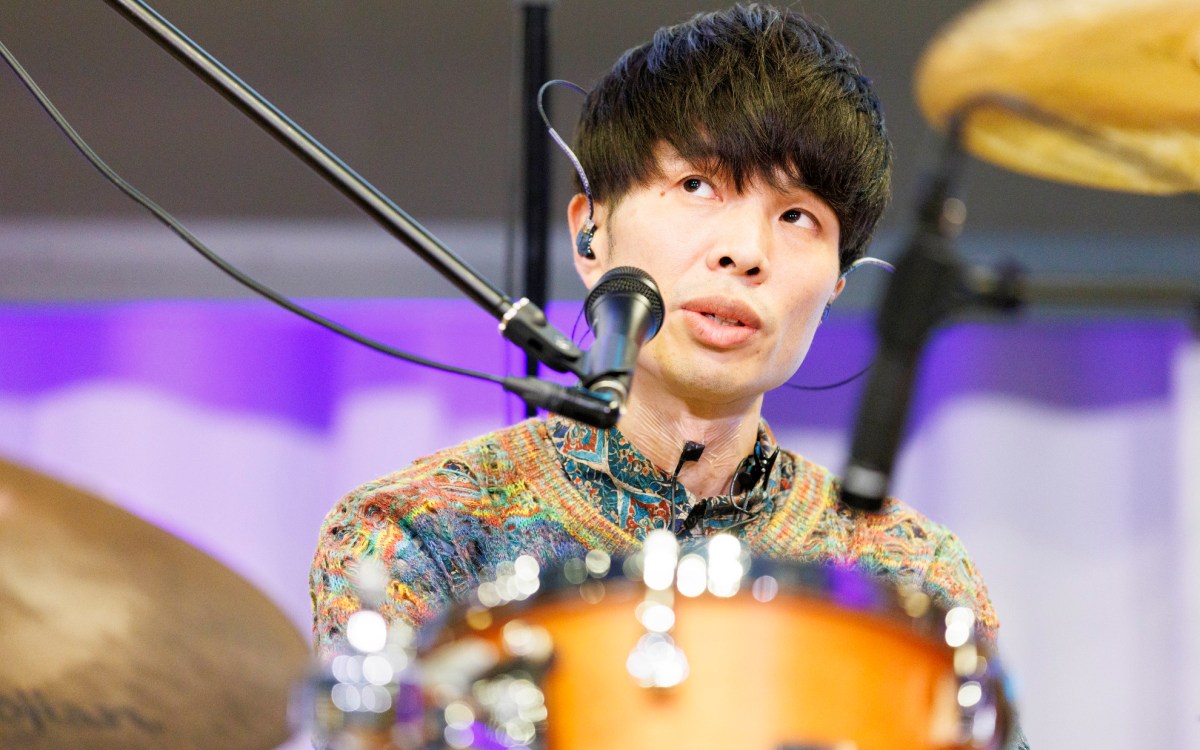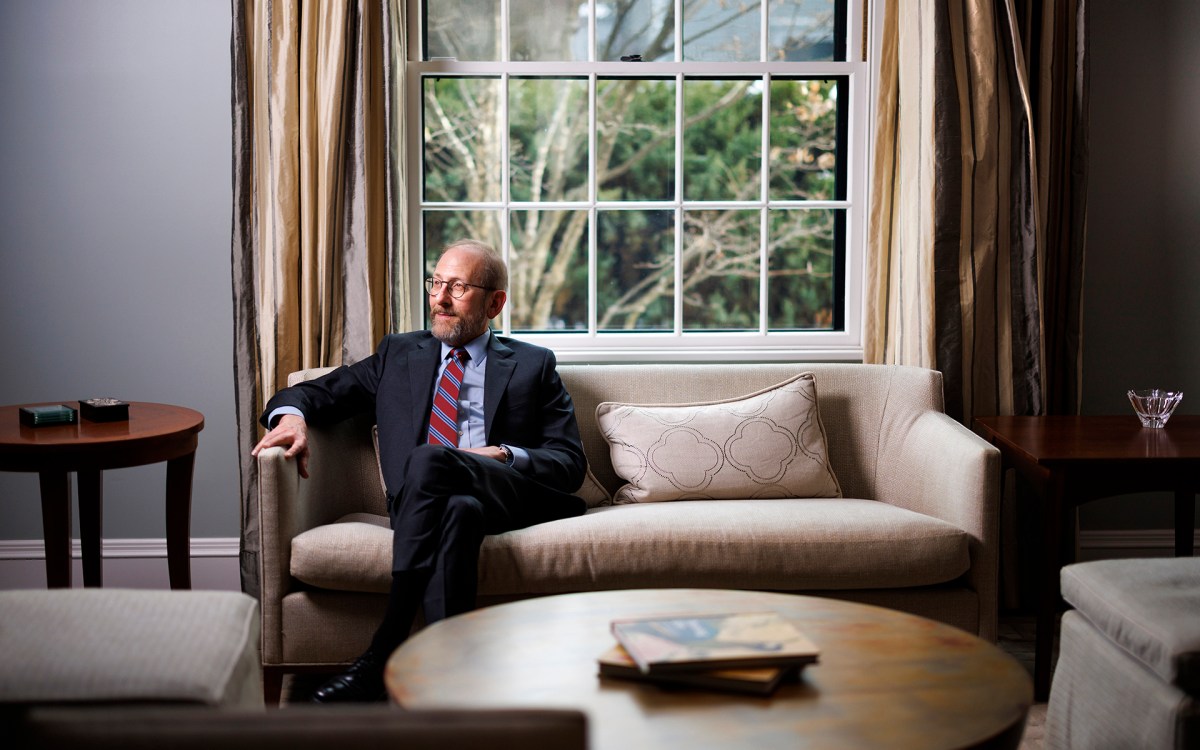Arts & Culture
-

Immersed in Toni Morrison’s multitudes
Professor’s book is an appreciation of Nobel-winning novelist’s ‘difficult’ oeuvre — and a defense
-

Audiobooks don’t really count as reading? Think again.
Education scholars say rigor, learning same as paper, stigma an unnecessary hurdle
-

Retelling Frederick Douglass’ story, with a soundtrack
Senior composes musical about abolitionist’s early life
-

‘The sound stopped suddenly’
After rare condition robbed drummer of ability to play music, science led him back
-

Moved by what’s missing in Homer’s ‘Harrow’
Curator launches series steeped in U.S. history
-

Tina Fey’s keys to a good joke: Snark, confidence, surprise
Comedian keeps Harvard crowd laughing with longtime co-writer Robert Carlock ’95
-
Khan winners at Gund Hall
An exhibition featuring the winning projects of the Aga Khan Award for Architecture will run through May 21 in the gallery at Gund Hall, Harvard Graduate School of Design (GSD). The Aga Khan Program at the GSD and the Humanities Center at Harvard University organized the exhibition, in collaboration with the Aga Khan Award for Architecture, now in its 10th cycle (2005-07). The exhibit was curated by GSD Professor Hashim Sarkis.
-
Filmmaker literally deconstructs classic, avant-garde movies
For filmmakers, the visual image is vital. But movie producer Rebecca Baron is more interested in what you can’t see.
-
Martorell conducts his own sort of life class at Fogg
Shortly after unpacking his bags and setting up his easel, Antonio Martorell is ruminating on the philosophy of art. “The materials, as such, are as important as subject matter. They become subject matter themselves — they are matter and they matter.”
-
‘Embracing our own being’
Controversial pop artist Jeff Koons brought his unique perspective to the Carpenter Center Thursday night (April 3), speaking about his work and philosophy to an invited audience of just over 200.
-
Symposium held on ‘Olympic’ architecture
The Olympics are never just about sport. This summer’s Beijing Olympics have been emphatically about architecture, too. In preparation for the games this August, the Chinese capital is undergoing an urban transformation unprecedented in recent history.
-
Arts In brief
A.R.T. PRODUCTION UP FOR TOP AWARD LOCKWOOD, JUILLIARD STRING QUARTET TO EXPLORE BEETHOVEN
-
The story behind ‘Storied Walls’
In March 2001, Bill Saturno, a newly minted Harvard Ph.D., was in Guatemala searching for recently uncovered hieroglyphics as a research associate of the Peabody Museum. It turned out that his guides were overbooked and his planned expedition had to be canceled. As a sort of consolation prize, the company offered Saturno a three-hour Land Rover ride to San Bartolo in the Peten jungle, an area unexplored by archaeologists, to take a look at a Maya pyramid. Three hours turned into an overnight stay, then an arduous eight-hour hike in 100-degree heat to the pyramid.
-
Panel discusses paucity of designing women
Women in Design, a student group at the Harvard Graduate School of Design (GSD) that aims to increase the visibility of women in the field, kicked off its four-part spring symposium, “Progress in Process,” Thursday night (March 13) with a panel discussion on where women in architecture are now and where they are headed. Department of Architecture Chair Toshiko Mori moderated the event, which was held in Gund Hall’s Piper Auditorium and attracted a crowd of about 150 people — mostly, it was noted by panelists, women.
-
With old forms, improvisation, Bielawa creates ingenious anachronism
Manhattan composer Lisa Bielawa is a Radcliffe Fellow this year. Her tiny studio on Concord Avenue is spartan: white walls, a piano, a violin, two chairs, a table strewn with music staff paper. On one side is the glow of a computer. On the other is a single window, with a blur of trees beyond. But the little studio, as Shakespeare wrote of art, is such stuff that dreams are made on. The dream that Bielawa made at Radcliffe this year is “Double Violin Concerto,” a 24-minute composition that premieres in Boston next week (March 29). It pays homage to music’s past by reviving an old form. (Double concertos were last popular in Antonio Vivaldi’s 18th century.)
-
Conference brings out pacific potential of African hip-hop
Harvard and hip-hop. One is the famous university, the other the music style marked by rapping, rhyming, and a synthetic backbeat. Both begin with the letter “h.” Nothing else in common, right? Wrong. Harvard last week (March 13-15) hosted a three-day conference on African hip-hop, a musical style that experts say not only makes audiences move, but that moves audiences — toward education, civic action, and peaceful change.
-
African American National Biography launched
From Aaron, a former slave without a last name, through Paul Burgess Zuber, a 20th century lawyer and professor, the recently published African American National Biography (Oxford University Press, 2008) is the most extensive and inclusive collection of biographical information about African American lives ever published. The African American National Biography (AANB), co-edited by Henry Louis Gates Jr. and Evelyn Higginbotham, is an eight-volume series that includes biographies of more than 4,000 African Americans throughout 500 years, dating back to the arrival of Esteban, the first recorded African explorer to set foot in North America.
-
Thriving cities ‘connect smart people’
In a fast-paced lecture at the Harvard Graduate School of Design Thursday evening (March 6), Edward Glaeser, the Fred and Eleanor Glimp Professor of Economics, explained what he called the “central paradox” of cities in the postindustrial age.
-
Mining a trove of old ballads gives women a new voice
In the mid-1930s, Milman Parry, a professor in the Department of the Classics at Harvard, traveled throughout Yugoslavia to research and record folk songs. Assisted by his former student Albert Lord, Parry spent 15 months on the road and returned to Harvard with innumerable texts and sound recordings of more than 1,500 epic songs. Their findings now comprise the Milman Parry Collection at Harvard, housed in Widener Library.
-
A series of concerts by Fromm Players marks 60 years of electronic music
The names Mozart, Beethoven, Bach, and Haydn are etched in a ring near the ceiling of Harvard’s Paine Hall. It’s an open question whether these classical masters would have recognized the music performed there last week (March 7-8). But at least one performer is certain that they’d understand.
-
Synchronized effort rescues collection
Heavy rain Saturday night (March 8) caused a large drainpipe to rupture in Pusey Library. More than 500 gallons of water poured into the Harvard Theatre Collection stacks and seeped through the floor, flooding the three levels beneath it. At risk were hundreds of original drawings of costume and set designs, hand-painted theatrical backdrops, and Early American manuscripts and books, including the Emily Dickinson family library from Houghton Library, the University’s rare book depository.
-
Celebrating thirty years at helm of choruses at Harvard
“It’s one of those great moments in Western music. It’s the highest level of the compositional technique of Bach, one of the most difficult [pieces] to sing,” said Jameson Marvin, director of choral activities and senior lecturer on music at Harvard University. Marvin will conduct the Harvard-Radcliffe Collegium Musicum, an undergraduate chorus, along with musicians drawn from the Handel and Haydn Society, in Bach’s Mass in B Minor at Sanders Theatre at 8 p.m.
-
Redman ’91 to be awarded 2008 Harvard Arts Medal
In conjunction with Harvard’s Arts First festival (May 1-4), Grammy-nominated saxophonist, recording artist, and jazz bandleader Joshua Redman ’91 will receive the 2008 Harvard Arts Medal. President Drew Faust will present the award to Redman, who is the 14th distinguished Harvard or Radcliffe alum or faculty member to receive this accolade for excellence in the arts and contributions to education and the public good.
-
Exhibit reveals special in the mundane
The new — and, for now, last — exhibit at the Fogg Art Museum, “Long Life Cool White: Photographs by Moyra Davey,” offers a subtle distillation of the mundane into the profound. The retrospective collection of 40 color and black-and-white shots is culled from the artist’s 20-year career and takes its name from a common fluorescent bulb. Like its title, the show includes images of mostly everyday things, taken largely in Davey’s homes over the past two decades.
-
Conscious craft is behind the work of African artists
Zoe Whitley flew in from London last week, and by Friday afternoon (Feb. 29) — going through her notes at a Harvard lectern — she really needed a cup of coffee. Whitley was among more than 15 art scholars, critics, gallery owners, curators, and working artists invited to a public conference Feb. 29-March 1 at the Center for Government and International Studies building on Cambridge Street.
-
Mulatu Astatke gives a primer on Ethiopian music, culture
It’s not easy to be a musician in most of the Third World, said legendary Ethiopian composer and musician Mulatu Astatke, who is a 2007-08 Radcliffe Fellow. Music is not typically taught in elementary schools, and in later life, opportunities for musicians are limited by poverty. In Ethiopia “we have beautiful music, beautiful dance, and in general we have a beautiful culture — but little chance to develop,” said Mulatu (Ethiopians are generally referred to by their first names) in a Feb. 27 presentation.
-
Master artist gives master class
Herbie Hancock radiated coolness — from his hip, all-black attire, to his trademark, slightly tinted glasses, to his deep soulful voice, to his calm, measured delivery. And as unmistakable as his aura of cool was his sincerity. Both qualities and more were on display Friday (Feb. 29) in the junior common room in Kirkland House where the noted musician sat and talked about his career and his thoughts on music and life with about 50 students including members of the Harvard Jazz Band and other musicians.
-
Jazz great Herbie Hancock takes home Artist of the Year
Music legend Herbie Hancock received the 2008 Cultural Artist of the Year Award from the Harvard Foundation for Intercultural and Race Relations at the organization’s 23rd annual Cultural Rhythms celebration, an afternoon and evening of performances from a diverse cultural mix of 29 student groups. Hancock was feted at the first of two shows (March 1) at Sanders Theatre where it was hard to tell who was having more fun, the performers or the jazz great himself.
-
The first civil rights movement
Most of us think of the Civil Rights movement as something that took place in the transitional 1950s and the tumultuous 1960s. It’s seen as a cultural artifact squeezed between the defiance of Rosa Parks (1955) and the demise of Martin Luther King Jr. (1968).
-
Goodfellow Liotta visits University
Film actor Ray Liotta recently (Feb. 25) visited the Harvard Foundation as a special guest. He met with representatives of several student cultural organizations, including the Harvard Italian-American Cultural Society.
-
New Ph.D. film program launched
The study of moving images has always been viewed through a wide lens at Harvard. Since the beginning, film studies at the University has sought to incorporate a broad range of disciplines in order to appreciate and understand the visual experience. The rich fields of philosophy, psychology, and the fine arts were all mined early on to examine the medium. Harvard widened its scope recently with the announcement of a new doctoral program in film studies in the Department of Visual and Environmental Studies (VES). The program, its creators said, will build on the University’s eclectic approach to the subject.
-
Hollywood writer wins kudos at Rosovsky Hall
Irreverence was the theme of the evening (Feb. 21) as one of the sharp satirical minds behind the nation’s quirkiest cartoon family addressed a rapt audience at Harvard Hillel’s Rosovsky Hall. Mike Reiss ’81, a founding writer of the animated series “The Simpsons,” gave the crowd what they came for with an hourlong stand-up routine peppered with sarcasm and profane punch lines. His younger audience members and their parents, all equally adoring fans, roared their approval.
-
Playwright Tony Kushner to deliver Tanner Lectures
Pulitzer Prize-winning playwright Tony Kushner will deliver this year’s Tanner Lectures on Human Values, sponsored by the Office of the President and the Department of English at Harvard University. Kushner will speak on the topic “Fiction That’s True! Historical Fiction and Anxiety” on April 9 and 10 at 4:30 p.m. in Lowell Lecture Hall. On April 11 from 10 a.m. to noon, Kushner will lead a seminar with Harvard commentators at the New College Theatre.
-
Exploring the shadows
“If you wouldn’t tell Stalin, don’t tell anyone else!” In the early years of the Cold War, a billboard near an atomic bomb testing site in New Mexico urged passersby to keep research developments close to the vest. Secrecy was of the utmost importance in that era — and not just in scientific circles — as Americans nervously watched the Soviet Union expand its influence throughout the East.
-
Fieldwork, community service key in study abroad
Long lines at the airport customs desk? Blame those Harvard undergraduates — in the 2006-07 academic year alone, 1,458 students had an international experience of some kind. While summer travel has historically been the most popular option, increasing numbers of undergraduates are choosing to spend a full semester abroad.
-
Hancock named Harvard Foundation Artist of the Year
The Artist of the Year award will be presented to Herbie Hancock during the Harvard Cultural Festival on Saturday (March 1) in Sanders Theatre. He will receive the award during the afternoon show, which starts at 3 p.m.


